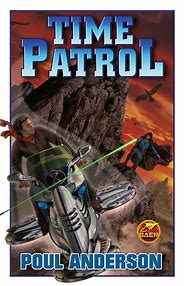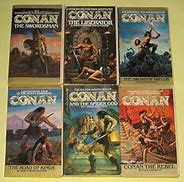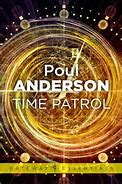Tuesday, 29 October 2019
Miserly Gods
The Time Patrol remains an endless source of quotations and comparisons. (See here.)
Eodan captures the Bona Dea but thinks:
"...the Powers which stole everything else from him gave him victory in war, a miser's payment..." (p. 166)
Manse Everard of the Time Patrol thinks:
"A man had to take whatever the gods offered him, and they were a miserly lot."
-Poul Anderson, "Brave To Be A King" IN Anderson, The Guardians Of Time (New York, 1981), pp. 65-124 AT 4, p. 85.
See Are The Gods Miserly Or Generous?
Odin is sometimes not just miserly but false. See Who To Pray To?
When God is believed to be one, omniscient, omnipotent and omnibenevolent, then there is a Problem of Evil: why does He allow, indeed cause, suffering and injustice? - whereas, when the gods are believed to be many and finite, then there is no such problem. Life remains a mixture of good and bad, as it always was.
Friday, 27 April 2018
No Atheists In Foxholes?
Addendum: My saved images are again accessible. If you google images of "No atheists in foxholes," you will find this reply attributed to more than one person. I have copied the image quoting Kurt Vonnegut because he is an sf writer.
Sunday, 29 October 2023
The Gods In Space And Time
We Claim These Stars, CHAPTER VI.
Flandry:
"And in that well-worn nick of time, which goes to prove that the gods, understandably, love me, helped arrived." (p. 35)
Manse Everard of the Time Patrol:
Thursday, 21 June 2018
Are The Gods Miserly Or Generous?
Here is Malcolm Lockridge's equivalent reflection:
"Life was physically harder in some places, harder on the spirit in others, and sometimes it destroyed both. At most, the gods gave only a little happiness; the rest was mere existence. Taken altogether, he didn't think they were less generous here and now than they had been to him."
-Poul Anderson, The Corridors Of Time, CHAPTER SIX, p. 53.
"The gods" are a way of reflecting on "life."
Two friends that I have met in Pagan moots:
Nygel, a Wiccan high priest, refers to "the gods";
Andrea says that his deity is Fortuna, personified chance.
People personified external forces in order to get a handle on them and placate them. However, Fortuna is to be respected but never prayed to or entreated. Thus (I suggest), her temple is a half-way house between polytheism and atheism. She favors the brave - which Poul Anderson's heroes are.
Saturday, 14 January 2017
"Gods send..."
Polytheism appeals to my imagination but not to my intellect. Once a year in Lancaster (see image), we chant in a communal orchard:
"Pray Gods send us a roaring good crop."
This is an inclusive prayer because even someone standing beside you cannot hear whether you chant "...Gods send..." or "...God send..."
Tuesday, 6 December 2016
Reflections
Everard reflects:
"A man had to take whatever the gods offered him, and they were a miserly lot."
-Poul Anderson, "Brave To Be A King" IN Anderson, Time Patrol (Riverdale, NY, 2006), pp. 55-112 AT p. 74.
Two differences between Everard and van Rijn:
van Rijn refers to saints, not to gods;
Everard, of course, does not believe that any of these superior beings literally exist.
However, it is a natural way to think, especially when Everard has time traveled to ancient Persia where gods were part of life. But we still do it now, projecting concepts applicable to psychology and society onto nature and the cosmos:
I complain that life was not designed better, forgetting that I do not believe that it was designed;
I spontaneously address the One as "Lord," although my philosophy tells me that It, or (to use a Hindu term) THAT, cannot be a person;
looking at it from the other direction, I imagine that few people who travel with a St Christopher medal believe that the story of Christopher carrying Christ carrying the world is literally true - it is a good story about travel and that is all that matters.
Gods and some saints are good stories or, in Alan Moore's phrase, "higher fictions." Thor has made a good transition from altars and prayers to comic books and films. On this note, I will shortly post my personal list of the three top gods.
Monday, 28 May 2018
Beginnings And Gods
"'...it probably went clear back to the Beginning.'"
-Poul Anderson, "Brave To Be A King" IN Anderson, Time Patrol (Riverdale, NY, 2010), pp. 55-112 AT p. 83.
Unlike Heraclitus, we know of a cosmic Beginning but what, if anything, was before it?
Time Patrolmen know of "gods" because they continually visit periods where divine powers and presences are taken for granted. Thinking in these terms, Manse Everard has learned that the gods "...were a miserly lot." (p. 74) However, human history is guarded by the Time Patrol and, beyond them, the Danellians. One Danellian comments:
"'In a reality forever liable to chaos, the Patrol is the stabilizing element, holding time to a single course. Perhaps it is not the best course, but we are no gods to impose anything different...'"
-Poul Anderson, The Shield Of Time (New York, 1991), 1990 A.D., p. 435.
Similarly, James Blish's Service agents could try to change the foreknown future but decide instead to implement the policy:
"'To Whom it may concern: Thy will, not mine.'"
-James Blish, The Quincunx Of Time (New York, 1983), CHAPTER TEN, p. 104.
Gods are active in Anderson's heroic fantasies but not in his Time Patrol series.
Thursday, 24 July 2025
Ivory, Apes, Peacocks And Jealous Gods
Conan The Rebel, III.
"'With what ivory, apes, and peacocks we could muster, I sent back a commission for a warcraft to be built and outfitted.'" (p. 29)
For some history of the phrase, "ivory, and apes, and peacocks," see two previous posts here.
Belit says that Conan and she will have:
"'...a life together. If the jealous gods allow.'" (ibid.)
Probably series editors and authors will not allow but I cannot remember what shape the Conan-Belit relationship is in at the end of this volume and will wait to find out.
We know of one "jealous god" in the Bible but what is the origin of this phrase? Were other gods "jealous"?
Belit's remark reminds us of Manse Everard's realization that the gods are "...a miserly lot." Time travellers who spend a lot of time in the past probably learn to think that way.
I expect to be doing more gardening than blogging tomoz.
Laterz.
Monday, 18 January 2021
Gods And Devils On Diomedes
The Man Who Counts, XVII.
Wace thinks of miserly gods (p. 258) and the flying, fighting Diomedeans resemble "Bat-winged demons..." (p. 255) Thus, the Diomedean sea battle suggests a battle in Hell and such a battle, i.e., in Hell, does occur in Poul Anderson's Operation Chaos:
Tuesday, 8 August 2023
Fickle And Miserly
The Dog And The Wolf.
Uail maqq Carbri of Tuath Caelchon in Mide:
"'...that would have been as the Gods willed, and a fickle lot They are, as every sailor and warrior well knows.'" (XXIII, 5, p. 466)
Manson Emmert Everard, Unattached agent, Time Patrol:
Wednesday, 7 December 2016
More On Everard
"'What I'm trying to make you know, not in your forebrain but in your marrow, is that reality never conforms very well to the textbooks, and sometimes it doesn't conform at all.'"
-Poul Anderson, "The Sorrow Of Odin The Goth" IN Anderson Time Patrol (Riverdale, NY, 2006), pp. 333-465 AT p. 387.
In Everard's career, this statement is intermediate between miserly gods and cosmic capriciousness. He is learning. Later still, he learns more, from a Danellian:
"'In a reality forever liable to chaos, the Patrol is the stabilizing element, holding time to a single course...left untended, events would inevitably move toward the worse. A cosmos of random change must be senseless, ultimately self-destructive. In it could be no freedom.'"
-Poul Anderson, The Shield Of Time (New York, 1991), p. 435.
Thus, the Time Patrol universe is anthropic. Intelligence exists because intelligent beings, having come into existence, travel into the past to ensure the conditions for their own existence. They are responsible for any apparent synchronicity. Their role is that of "gods," like the far future beings encountered by a single time traveler in "Flight to Forever."
Tuesday, 6 December 2016
Continuing To Explore The Wisdom Of Manse Everard
"...the structure of the plenum...isn't just changeable in time as well as space. It seems to be subtler and trickier than they see fit to teach us at the Academy. Coincidences can be more than accidents. Maybe Jung glimpsed a little of the truth, in his notions about synchrony - I dunno. The universe isn't for the likes of me to understand. I only work here."
-Poul Anderson, The Shield Of Time (New York, 1991), p. 261.
For Jungian "synchronicity," see here.
Because spatial relationships change, we refer to time as the relationship between a spatial relationship changed from and a spatial relationship changed to. If temporal relationships were to change, then there would have to be a succession of four dimensional spatiotemporal continua, e.g.:
in the first continuum, the Scipios survive the Battle of Ticinus and Rome wins the Second Punic War;
in the second continuum, the Scipios are killed at Ticinus and Carthage wins the Second Punic War, now calling it the Second Roman War;
the relationship between the two continua would be a second temporal dimension in which it is meaningful to say that now history is different.
But Everard suspects that something more is happening. But he does not understand what. We all work in the universe and some of us are retired here! We can try to understand it both for practical purposes and as a theoretical exercise.
Thursday, 23 March 2017
More Kinds Of Interactions
 See here.
See here.The nature of an interaction may be ambiguous:
"Whether in superstition or in metaphor, Cerialis replied, surprisingly quietly, 'That will depend on the goddess, won't it?'"
-Poul Anderson, "Star of the Sea" IN Anderson, Time Patrol (New York, 2006), pp. 467-640 AT p. 609.
Or theistic language may continue to be used when there is no longer any belief in it:
"A man had to take whatever the gods offered him, and they were a miserly lot."
-Poul Anderson, "Brave To Be A King" IN Time Patrol, pp. 55-112 AT p. 74 -
- especially when, as in this case, the individual is operating in an appropriate milieu.
Treating strangers as if they are gods or angels in disguise is good policy. Polytheism appeals to my imagination though not to my intellect. It would be good if invoking Neptune or St Nicholas before embarking on a sea voyage made a difference - but we can continue to appreciate the stories and imagery in any case. Presumably no one repeating the story of St Christopher believes that it is literally true?
Friday, 14 August 2015
Autumn Wind
"'Cut out that shimmy...'" (Time Patrol, p. 65)
Having googled this word, I am still not sure what he meant by it.
The proverbially rich Croesus tells Everard that Cyrus' life was threatened in infancy but that he was hidden and grew up as a herdsman until he could come forth, attested by signs. After hearing this:
"Everard lay quiet on the couch for a while. He heard autumn leaves rustle dryly in the garden, under a cold wind." (p. 73)
The cold autumn wind underlines the mystery of what he has heard. He must ask:
"'This is true, and no fanciful gossip?'" (ibid.)
Yes, it is confirmed by Cyrus and by others who were involved, all of them Persians fanatical about truthfulness.
"...yet Everard had heard nothing so fantastic in all his Patrol career." (ibid.)
It is the hero myth told by Herodotus of Cyrus but also told of many others. Everard/Anderson lists three but we can think of more, including the central figure of Matthew's Gospel. That cold wind sounds as if blows from the same source as such legendary stories.
When Everard finds a slave girl waiting in his room, he tells us one of the lessons learned by time travelers:
"A man had to take whatever the gods offered him, and they were a miserly lot." (p. 74)












